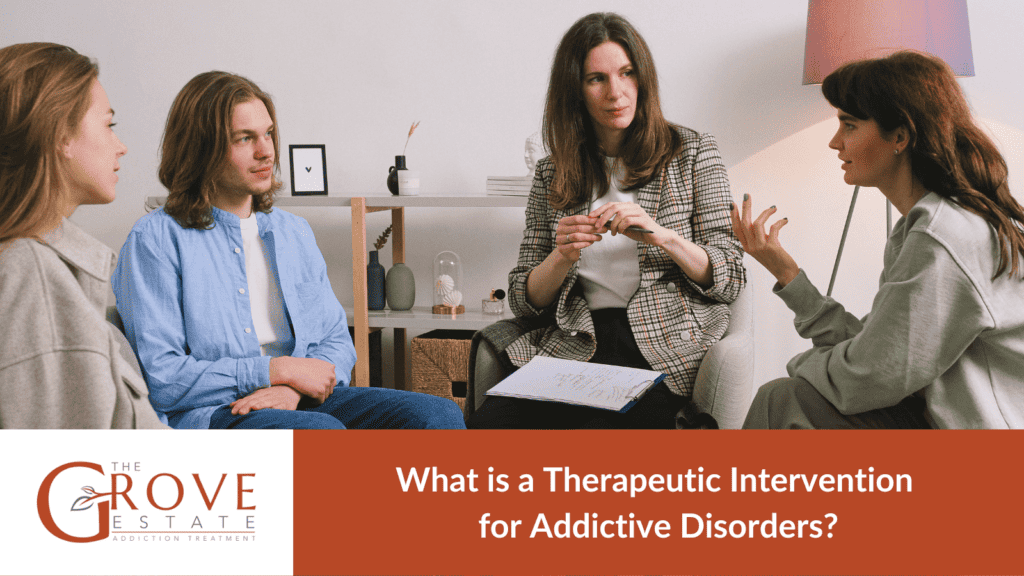The prevalence and impact of addiction in society necessitate a comprehensive understanding of the various therapeutic interventions available. Addiction, a complex condition characterized by compulsive substance use despite harmful consequences, affects not only the individual but also their families and communities.
From traditional methods to innovative approaches, therapeutic intervention for addiction can be a start for individuals struggling with addictive behaviors to get on the right path. Many addicts live in denial that a problem is even present and therapeutic interventions help them understand that their addiction is a disease that needs to be treated. These sessions are the best way to start on the path toward a healthy fulfilling sober life.

What is a Therapeutic Intervention for Addictive Disorders?
A therapeutic intervention, which could also be known as a crisis intervention for more severe cases, for refers to a set of structured and professional approaches designed to treat individuals struggling with addiction. These interventions address the physical, psychological, and behavioral aspects of addiction. They range from individual and group counseling, cognitive-behavioral therapies, and medication-assisted treatment, to holistic approaches like mindfulness and stress management techniques. The goal is to help individuals overcome their dependence on substances, develop healthy coping mechanisms, and work toward long-term recovery and well-being.
What Are The Types Of Therapeutic Interventions for the Treatment of Addiction?
Therapeutic interventions for addiction treatment are diverse and cater to the complicated nature of addictive disorders. These interventions aim to address not only the physical dependence but also the underlying psychological and social factors contributing to addiction.
1. Cognitive Behavioral Therapy
CBT is a widely used approach that helps individuals recognize and change maladaptive thought patterns and behaviors related to substance use. It empowers patients to develop coping strategies and problem-solving skills.
2. Dialectical Behavioral Therapy
DBT focuses on teaching patients skills to manage stress, control emotions, and improve relationships. It is particularly effective for individuals with dual diagnoses, such as substance abuse and mental health disorders.
3. Rational Emotive Behavior Therapy (REBT) for Addiction
REBT centers on identifying irrational beliefs and negative thought patterns, challenging these beliefs, and replacing them with more rational and positive thoughts.
4. Drug Therapy in Addiction Treatment
Drug Therapy involves using medications to manage withdrawal symptoms, reduce cravings, or treat co-occurring disorders. It is often used alongside other therapeutic interventions.
5. Brief Strategic Therapy-Family Systems Training (BST-FST)
BFT integrates family therapy into addiction treatment, recognizing the role of family dynamics in addiction and recovery. It focuses on changing family interactions that contribute to the addiction.
6. Group Therapy
Group Therapy offers a platform for individuals to share experiences and learn from each other in a supportive environment, fostering a sense of community and belonging.
7. The Matrix Model
This is a comprehensive, multi-component approach combining behavioral therapy, family education, individual counseling, 12-step support, drug testing, and encouragement for non-drug-related activities.
8. Motivational Therapies
Motivational Interviewing (MI), focuses on enhancing an individual’s motivation to change their substance use behavior through a non-confrontational, empathetic approach.
9. Eye Movement Desensitization and Reprocessing
(EMDR) is primarily used for trauma-related issues often co-occurring with addiction. It involves processing distressing memories and beliefs associated with substance use.
10. Twelve-Step Facilitation (TSF)
(TSF) is a structured approach to recovery that encourages participation in 12-step programs like Alcoholics Anonymous. It emphasizes acceptance, surrender, and active involvement in recovery-focused activities.
11. Contingency Management (CM)
(CM) is a behavioral therapy that provides tangible rewards for positive behaviors such as maintaining sobriety. This method is effective in promoting abstinence and treatment adherence.

How Can Drug Addiction Therapy Help Me?
Drug addiction therapy can offer substantial benefits in overcoming addiction and helping with long-term recovery. It provides a structured environment to understand and address the root causes of addiction, such as emotional or psychological issues. Through therapy, individuals learn practical strategies to manage cravings and avoid triggers.
It also assists in developing healthier coping mechanisms and life skills, essential for maintaining sobriety. Additionally, therapy often involves building a supportive network, which is critical for encouragement and accountability. By addressing both the mental and emotional aspects of addiction, therapy plays a pivotal role in not just achieving sobriety, but also in promoting overall mental health and well-being, enhancing the quality of life beyond addiction recovery.
Do I Need a Substance Abuse Therapist or a Recovery Therapist?
Deciding between a substance abuse therapist and a recovery therapist depends on your specific needs and stage in the journey toward overcoming addiction.
A substance abuse therapist specializes in the treatment of addiction itself. They are skilled in addressing the immediate challenges of substance abuse, such as managing cravings, withdrawal symptoms, and psychological dependence on substances. This type of therapist is often sought at the beginning stages of addressing substance use disorders.
On the other hand, a recovery therapist typically focuses on the long-term aspect of living a sober life. They help individuals develop coping strategies, rebuild their lives, and address underlying issues that may have contributed to the addiction. Recovery therapy is often beneficial for those who have completed a treatment program or detox and are in the process of maintaining their sobriety.
In some cases, these roles can overlap, and many therapists are equipped to handle both aspects of addiction treatment. The key is to assess where you are in your journey and what your immediate needs are. It’s also common for individuals to transition from a substance abuse therapist to a recovery therapist as they progress in their journey.
What are the 3 Main Types of Drug Prevention and Control?
The three main types of drug prevention and control strategies are:
- Primary Prevention: This approach aims to prevent drug use before it even begins. It focuses on educating the general population, particularly vulnerable groups like children and teenagers, about the risks and consequences of drug use. Primary prevention strategies include school-based education programs, community awareness campaigns, and promoting healthy lifestyle choices that discourage the initiation of drug use.
- Secondary Prevention: This type targets individuals who have begun using drugs but have not yet developed a substance use disorder. The goal is early identification and intervention to prevent the escalation of drug use. This can involve screening programs in schools, workplaces, or healthcare settings, and providing early counseling, educational workshops, or support groups for those at risk.
- Tertiary Prevention: This type focuses on treatment and rehabilitation for individuals who already have a substance use disorder. Tertiary prevention aims to reduce the harm associated with drug use, prevent relapse, and reintegrate individuals into society as productive members. It includes a range of treatments such as detoxification, medication-assisted treatment, therapy, support groups, and aftercare programs to support ongoing recovery.
Together, these three types of prevention and control strategies work at different levels to tackle drug use issues, from preventing initiation, and addressing early use, to treating established addiction, thereby covering the full spectrum of drug use and its impacts on individuals and society.

What is the Addiction Rule of 3?
The Addiction Rule of 3, also known as the “Rule of Thirds” in addiction, is a concept often mentioned in recovery and the long-term outcomes for individuals with substance use disorders. It’s important to note that this rule is more anecdotal and observational in nature rather than a scientifically proven rule. The Addiction Rule of 3 suggests the following distribution among people with addiction:
- One-Third Recover Fully: This portion of individuals eventually recovers from their addiction. They manage to maintain long-term sobriety, often with the help of treatment, support groups, and personal commitment to staying drug-free.
- One-Third Relapse Periodically: This group includes individuals who experience periods of sobriety interspersed with relapses. Their journey is marked by a cyclic pattern of recovery and relapse, often requiring multiple treatments or interventions.
- One-Third Experience Chronic Issues: This last third continues to struggle with addiction throughout their lives, possibly facing chronic health issues, legal problems, or even premature death due to their substance use.
How does cognitive behavioral therapy assist in addiction recovery?
Cognitive Behavioral Therapy (CBT) aids addiction recovery by helping individuals identify and change negative thought patterns and behaviors associated with substance use. It equips them with coping strategies and problem-solving skills to deal with challenges without resorting to drugs or alcohol.
What makes Dialectical Behavioral Therapy effective for substance abuse?
Dialectical Behavioral Therapy (DBT) is effective for substance abuse as it teaches skills to manage stress, control emotions, and improve relationships, crucial for individuals with dual diagnoses, like substance abuse coupled with mental health disorders.
Can Rational Emotive Behavior Therapy (REBT) change addiction behavior?
Rational Emotive Behavior Therapy (REBT) targets addiction by identifying irrational beliefs and negative thought patterns, challenging these beliefs, and encouraging more rational, positive thoughts, which can lead to changes in addictive behaviors.
How does medication assist in treating and intervening in addiction?
Medications in addiction treatment help manage withdrawal symptoms, reduce cravings, and treat co-occurring disorders, often used alongside other therapeutic interventions to enhance recovery outcomes.
What role does family play in addiction treatment through Brief Strategic Family Therapy?
Brief Strategic Family Therapy (BST-FST) integrates family dynamics into addiction treatment, focusing on changing interactions that contribute to the addiction, and recognizing the crucial role family plays in the recovery process.
How does group therapy support addiction recovery?
Group Therapy provides a supportive environment where individuals can share experiences and learn from each other, fostering a sense of community and belonging that is vital for recovery.
What is the Matrix Model in addiction treatment?
The Matrix Model is a comprehensive approach that combines behavioral therapy, family education, individual counseling, 12-step support, and other components to offer a structured and supportive framework for overcoming addiction.
How does Motivational Interviewing encourage change in substance use behavior?
Motivational Interviewing (MI) enhances an individual’s motivation to change substance use behavior through a non-confrontational, empathetic approach, focusing on the personal reasons for change and reinforcing the individual’s ability to make positive changes.
Can Eye Movement Desensitization and Reprocessing (EMDR) aid individuals with addiction?
EMDR is beneficial for individuals with addiction, especially those with trauma-related issues, by processing distressing memories and beliefs associated with substance use, aiding in the emotional healing process.
How does Twelve-Step Facilitation (TSF) approach support recovery?
Twelve-step facilitation (TSF) encourages participation in 12-step programs like Alcoholics Anonymous, focusing on acceptance, surrender, and active involvement in recovery-focused activities, providing a structured path to sobriety.
What is Contingency Management in addiction therapy?
Contingency Management (CM) is a behavioral therapy that rewards positive behaviors such as maintaining sobriety, effectively promoting abstinence and adherence to treatment through tangible incentives.
How can therapeutic interventions help prevent relapse?
Therapeutic interventions can prevent relapse by addressing the underlying causes of addiction, teaching coping strategies for stress and triggers, and improving emotional regulation. Techniques like Cognitive Behavioral Therapy help individuals recognize and change thought patterns leading to substance use, while Contingency Management reinforces positive behavior changes. Group therapy and support systems provide social support, reducing feelings of isolation. Additionally, specific therapies like Dialectical Behavior Therapy focus on emotion regulation and interpersonal effectiveness, crucial for long-term recovery and relapse prevention.

Share This Post



